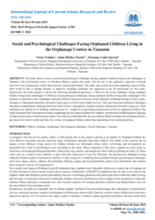Abstract:
The study aimed to assess social and psychological challenges facing orphaned children living in the orphanages in Tanzania. The motivational theory of Abraham Maslow guided this study with the use of the qualitative approach. In-depth interviews were employed to collect data from the research participants. The study was carried out in four orphanage centres within three wards in Dar es Salaam Region. A purposive sampling technique was employed to get 29 participants for this study.
Specifically, the study intends to answer the following unexplored questions:
- What are the social challenges facing orphaned children living in the orphanages?
- What are the psychological challenges facing orphaned children living in the orphanages?
The findings revealed that in the orphanages orphaned children experienced various social challenges including shortage of basic needs, shortage of educational materials, and lack of sport gears as well as poor health services. They also faced psychological challenges like physical punishment, bullying behaviours from fellows, segregation, isolation and poor attachment from their caregivers. Such challenges are indicators for defining ineffectiveness of caregivers in providing psychosocial services to orphaned children.
The study concluded that in the present context, orphanages are not a good residence for orphans’ psychosocial wellbeing due to shortage of funds and presence of untrained personnel. The study recommended that, the government should formulate interventional policies and enact laws which would look after the welfare of orphaned children rather than depending on the institutional care.

